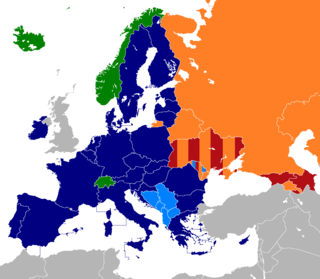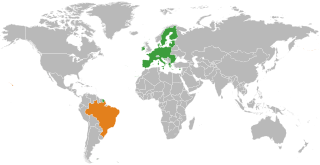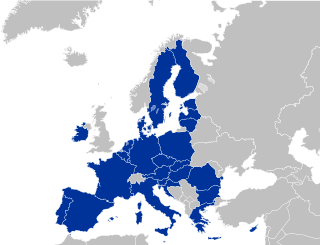
The European Free Trade Association (EFTA) is a regional trade organization and free trade area consisting of four European states: Iceland, Liechtenstein, Norway and Switzerland. The organization operates in parallel with the European Union (EU), and all four member states participate in the European single market and are part of the Schengen Area. They are not, however, party to the European Union Customs Union.

A trade agreement is a wide-ranging taxes, tariff and trade treaty that often includes investment guarantees. It exists when two or more countries agree on terms that help them trade with each other. The most common trade agreements are of the preferential and free trade types, which are concluded in order to reduce tariffs, quotas and other trade restrictions on items traded between the signatories.

The Andean Community is a free trade area with the objective of creating a customs union comprising the South American countries of Bolivia, Colombia, Ecuador, and Peru. The trade bloc was called the Andean Pact until 1996 and came into existence when the Cartagena Agreement was signed in 1969. Its headquarters are in Lima, Peru.

The Central European Free Trade Agreement (CEFTA) is an international trade agreement between countries mostly located in Southeastern Europe. Founded by representatives of Poland, Hungary and Czechoslovakia, CEFTA in 2006 expanded to Albania, Bosnia and Herzegovina, Bulgaria, Croatia, Moldova, Montenegro, North Macedonia, Romania, Serbia, Slovenia and Kosovo.
A European Union Association Agreement or simply Association Agreement (AA) is a treaty between the European Union, its Member States and a non-EU country or bloc of countries that governs bilateral relations. Areas frequently covered by such agreements include the development of political, trade, social, cultural and security links. The provision for an association agreement was included in the Treaty of Rome, which established the European Economic Community, as a means to enable co-operation of the Community with the United Kingdom, which had retreated from the treaty negotiations at the Messina Conference of 1955. According to the European External Action Service, for an agreement to be classified as an AA, it must meet several criteria:
1. The legal basis for [association agreements'] conclusion is Article 217 TFEU
2. Intention to establish close economic and political cooperation ;
3. Creation of paritary bodies for the management of the cooperation, competent to take decisions that bind the contracting parties;
4. Offering most favoured nation treatment;
5. Providing for a privileged relationship between the EC and its partner;
6. Since 1995 the clause on the respect of human rights and democratic principles is systematically included and constitutes an essential element of the agreement;
7. In a large number of cases, the association agreement replaces a cooperation agreement thereby intensifying the relations between the partners.

The European Trade Union Confederation (ETUC) is the major trade union organisation representing workers at the European level. In its role as a European social partner, the ETUC works both in a consulting role with the European Commission and negotiates agreements and work programmes with European employers. It coordinates the national and sectoral policies of its affiliates on social and economic matters, particularly in the framework of the EU institutional processes, including European economic governance and the EU Semester.

At present, there are six multi-lateral free trade areas in Europe, and one former free trade area in recent history. Note that there are also a number of bilateral free trade agreements between states and between trade blocks; and that some states participate in more than one free trade area.

Regional Integration is a process in which neighboring countries enter into an agreement in order to upgrade cooperation through common institutions and rules. The objectives of the agreement could range from economic to political to environmental, although it has typically taken the form of a political economy initiative where commercial interests are the focus for achieving broader socio-political and security objectives, as defined by national governments. Regional integration has been organized either via supranational institutional structures or through intergovernmental decision-making, or a combination of both.

The African Economic Community (AEC) is an organization of African Union states establishing grounds for mutual economic development among the majority of African states. The stated goals of the organization include the creation of free trade areas, customs unions, a single market, a central bank, and a common currency thus establishing an economic and monetary union.
An economic union is a type of trade bloc which is composed of a common market with a customs union. The participant countries have both common policies on product regulation, freedom of movement of goods, services and the factors of production as well as a common external trade policy. When an economic union involves unifying currency, it becomes an economic and monetary union.
Integration is a political and economic agreement among countries that gives preference to member countries to the agreement. General integration can be achieved in three different approachable ways: through the World Trade Organization (WTO), bilateral integration, and regional integration. In bilateral integration, only two countries economically cooperate with one another, whereas in regional integration, several countries within the same geographic distance become joint to form organizations such as the European Union (EU) and the North American Free Trade Agreement (NAFTA). Indeed, factors of mobility like capital, technology and labour are indicating strategies for cross-national integration along with those mentioned above.

Brazil and the European Union established diplomatic relations in 1960. The European Union and Brazil have close historical, cultural, economic and political ties. At the 1st EU-Brazil summit, in 2007, Brazil entered in a strategic partnership with the European Union, strengthening their ties. This new relationship places Brazil high on the EU's political map.

The Southern Common Market, commonly known by Spanish abbreviation Mercosur, and Portuguese Mercosul, is a South American trade bloc established by the Treaty of Asunción in 1991 and Protocol of Ouro Preto in 1994. Its full members are Argentina, Bolivia, Brazil, Paraguay and Uruguay. Venezuela is a full member but has been suspended since 1 December 2016. Chile, Colombia, Ecuador, Guyana, Panama, Peru, and Suriname are associate countries. Bolivia became a full member on 8 July 2024.

The Eurasian Economic Union is an economic union of five post-Soviet states located in Eurasia. The EAEU has an integrated single market. As of 2023, it consists of 183 million people and a gross domestic product of over $2.4 trillion.

Relations between the European Union (EU) and the United Kingdom of Great Britain and Northern Ireland (UK) are governed, since 1 January 2021, by the EU–UK Trade and Cooperation Agreement (TCA).

Argentina has strong cultural and historical links to the European Union (EU) and the EU is Argentina's biggest investor.
The European Union's (EU) Common Commercial Policy, or EU Trade Policy, is the policy whereby EU Member States delegate authority to the European Commission to negotiate their external trade relations, with the aim of increasing trade amongst themselves and their bargaining power vis-à-vis the rest of the world. The Common Commercial Policy is logically necessitated by the existence of the Customs Union, which in turn is also the foundation upon which the Single Market and Monetary Union were later established.

The European Union–Mercosur free trade agreement is a proposed free trade agreement on which the European Union and Mercosur reached agreement in principle in 2019. The planned deal was announced on 28 June at the 2019 G20 Osaka summit after twenty years of negotiations. The agreement is praised but also criticized by NGOs, scientists, unions, farmers and indigenous people with both positive and negative aspects usually balanced during discussions.















